I relish our work with seasoned, successful Entrepreneur Owner-Managers. In addition to highly entertaining story material, there are unlimited opportunities for “using the mind to watch our minds;” what psychologists call metacognition. The revelations that unfold seem inexhaustible. One emerging question I have been thinking about is why some EOMs I meet achieve unheard-of levels of coherent wellbeing—while others do not. Is it luck? Or is it something else? My current thinking is that the frugal explanation is busy-ness.
Sometimes in our popular culture, it seems as if we are surrounded by an elite-educated group of well-intentioned adolescents (in the metaphorical sense) who in their privileged upbringing, were taught that busy-ness is success. They confuse busy-ness with accomplishment.
But activity is not achieving. Busy-ness is complexity. What happens when you are busy and you find it is not compelling? That it does not result in achieving? That it does not quench the thirst for transformative thinking?
What do we know about busy-ness? Busy-ness is fueled by fear. Paraphrasing Dan Sullivan, we know busy-ness is a creativity killer. Busy-ness is a relationship killer. Busy-ness is a credibility killer. Ultimately, busy-ness is a consciousness killer. Busy-ness kills PHI.
Steven Pressfield calls this Resistance (his caps). It cannot be seen, touched, heard, or smelled. But it can be felt. Busy-ness is a repelling force, repelling us from optimal performance, optimal experience. It shoves us away, distracts us, prevents us from doing our best work. Is busy-ness really anything more than a kind of self-indulgent immediate gratification instead of working towards long-term learning, growing, giving? The ultimate procrastination.
We are wrong if we think we are the only ones struggling with busy-ness. How many of us have self-limited or temporarily impaired our wellbeing before we wake up to the recklessness of busy-ness? How many of us have flirted with drug or drink addiction, developed anxieties, neuroses, and tumors, succumbed to painkillers, compulsive cell phone use, or online screen time of all kinds—to self-medicate—simply because we dare not act on the thing that our hearts, our inner genius is calling us to do?
Look inside yourself. Do you hear it as I do? The small voice unfailingly urging you as it has a million times before, to focus on your edge, flow, alpha, unique ability, whatever you term the calling that is uniquely yours. You know it. And yet, I will guess you are no closer to taking action on it right now than you were yesterday or will be tomorrow. You are seduced by the crack cocaine of busy-ness and its resulting procrastination that is your comfort zone. Our fear of becoming the person we know in our hearts we are really capable of is experienced as busy-ness.
So how do we purposefully discard the busy-ness addiction? Well, consider this. What if we’re not born with unlimited choices to achieve? What if we cannot be beyond excellent at just anything we want to be? What if we come into this world with only certain superior talents or ability, and our challenge is to allocate our energy to find it, hone it, work it? If we were born to sculpt maybe it’s our job to sculpt. If we were born to teach, we work to teach like never has been seen before. What if we patiently, unswervingly, indefatigably go after the root cause of the busy-ness habit—that we are not passionately pursuing our unique ability in the world? That we are too fearful to do so.
Are you more powerful than you think you are? Hell yes you are. Why not behave accordingly?
I can read your mind. I see that person you want to become just ahead. Right over there. Just outside that semi-circle denoting your comfort zone. We have the power to change our lives in this very moment. To intentionally allocate our positive energy to our uniqueness. In the words of Tom Bilyeau, “Find the cause that you would die for. Now, live for it.”
Comfort is over-rated. Busy-ness is a killer. Adopting this mindset can change everything.
References and Further Reading:
Aurelius, Marcus, and Gregory Hays. Meditations. New York: Modern Library, 2002. Print.
Diamandis, Peter H. “How to Find Something You Would Die For, and Live for It.” Singularity HUB. Singularity University, 05 Oct. 2015. Web. Feb. 2016. http://singularityhub.com/2015/10/05/how-to-find-something-you-would-die-for-and-live-for-it/.
Diamandis, Peter H., and Steven Kotler. Bold: How to Go Big, Achieve Success, and Impact the World. New York: Simon & Schuster, 2015. Print.
Ferriss, Tim. The Tao of Seneca: Practical Letters from a Stoic Master. Seneca and Marcus LLC, 2016. Audiobook. Presented by Tim Ferriss Audio. Narrated by John A. Robinson.
Sullivan, Dan. “How To Avoid The Busyness Trap – Multiplier Mindset #21.” YouTube. Strategic Coach, 17 Nov. 2015. Web. Feb. 2016. https://www.youtube.com/watch?v=ZaYnqz0z1SI&index=21&list=PLOcufQtyDkNTp7hSGT-T5GXUr4QsiVxow.
Pressfield, Steven. The War of Art: Break through the Blocks and Win Your Inner Creative Battles. New York: Black Irish Entertainment, 2012. Print.
Rose, Todd. The End of Average: How We Succeed in a World That Values Sameness. New York: HarperCollins, 2015. Print.
Rosen, Tommy. Recovery 2.0: Move beyond Addiction and Upgrade Your Life. Carlsbad: Hay House, 2014. Print.
Sivers, Derek. Anything You Want: 40 Lessons for a New Kind of Entrepreneur. Dobbs Ferry, NY: Do You Zoom, 2011. Print.
© 2024 Bigelow LLC. All rights reserved.

